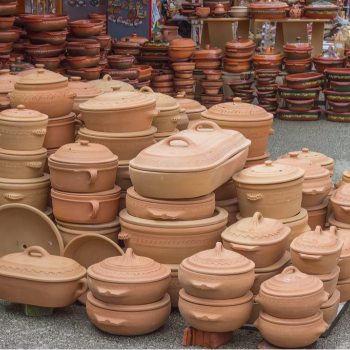In the bustling city of Mumbai, where skyscrapers touch the clouds and life moves at a relentless pace, lives a young woman named Priya Sharma. An ambitious marketing professional, Priya juggles the demands of her career with her passion for cooking. She takes pride in her culinary skills, often hosting friends for dinner and experimenting with traditional Indian recipes. However, one thing has always troubled her—the environmental impact of her kitchen practices.
Priya's story is not unique. Across India, many individuals like her are waking up to the reality of environmental degradation. The modern kitchen, with its reliance on plastic and non-biodegradable materials, contributes significantly to this crisis. Priya was determined to find a solution, one that aligns with her values of sustainability while preserving the authenticity of her culinary creations.
Enter eco-friendly clay utensils, a product that promises to bridge the gap between tradition and modernity. Made from natural clay, these utensils are biodegradable, non-toxic, and help retain the nutritional value of food. But how do they solve Priya's problem, and why should others consider making the switch?
To understand this, let's delve into the practical and emotional challenges faced by individuals like Priya. At the heart of the issue lies a deep nostalgia for the traditional cooking methods passed down through generations. Priya fondly remembers her grandmother’s stories of cooking in clay pots, where each meal was infused with a unique earthy flavor that modern cookware fails to replicate. The emotional connection to this heritage is something she deeply cherishes.
However, the practical challenge remains how to incorporate these traditional methods in a modern kitchen without compromising convenience and health? This is where clay utensils come into play. They offer a solution that is both practical and emotionally fulfilling. By using clay pots and pans, Priya can recreate those cherished flavors while knowing she is making a positive environmental impact.
Consider the case of Arjun Mehta, a well-known chef from Chennai, who transformed his restaurant by adopting eco-friendly kitchen practices. Arjun shares, "Switching to clay utensils has been revolutionary. Our customers love the authentic taste, and we have significantly reduced our carbon footprint." This shift not only enhanced the dining experience but also attracted a clientele that values sustainability.
For Priya, the decision to switch to clay utensils was a turning point. She found that her meals tasted richer and more authentic. Cooking in clay pots also required less oil, aligning with her health-conscious lifestyle. Moreover, knowing that these utensils would not add to the growing waste problem provided her with a sense of peace and fulfillment.
The benefits of clay utensils extend beyond the kitchen. They represent a lifestyle choice that champions sustainability, health, and tradition. While they require a bit more care, such as seasoning before use and avoiding sudden temperature changes, the trade-off is worth it for those committed to eco-friendly living.
In conclusion, the story of Priya Sharma and countless others highlights a growing trend a return to roots without forsaking modern conveniences. Eco-friendly clay utensils offer a tangible solution to the dilemma faced by today's environmentally conscious individuals. By choosing clay, you are not just making a purchase; you are making a statement—one that honors the past while paving the way for a sustainable future.
So, the next time you step into your kitchen, consider the legacy you wish to create. Embrace the warmth of tradition and the promise of sustainability with eco-friendly clay utensils. After all, every meal cooked in clay is a journey back to our roots, a taste of history served with a side of responsibility.
Visit Vyaparify Site:
https://id.vyaparify.com/seaclap-international 
